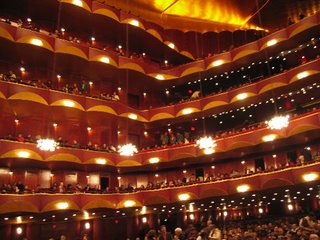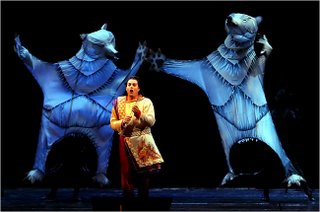 We had a magical experience today — we saw the year-end performance of The Magic Flute at the Metropolitan Opera House.
We had a magical experience today — we saw the year-end performance of The Magic Flute at the Metropolitan Opera House.Going to the opera is not something that we routinely do. But a thoughtful colleague who was out of the country this holiday left us her four orchestra-seat tickets to the child-friendly, 100-minute, matinee performance.
A couple of days ahead of this event I'd told Sweet M that we were going to the opera.
The opera, she exclaimed. The OP-PER-A. We can't go to the opera.
How come? I asked.
I don't know. But we can't go to the opera.
Then a day or two later she turned to me and asked: Do we have to have manners to go to the opera?
Yes, I said, We do have to have manners. But we do have manners — our manners are just fine — so we can go.
Then yesterday she got down to her real question.
Momma, do they have bathrooms at the opera?
Yes, I said, They definitely have bathrooms at the opera.
Do we have to have manners? Do they have bathrooms? Do we have to inhibit our behaviors? Do those people really manage to go all day without peeing? Having class is associated with bodily denial, with a steely self-discipline that is meant to both justify and atone for ones privileges. Sweet M wondered will my body betray me as being some sort of downtown animal, some sort of beastly creature? Her concern was simple: Will I fit in? Will I pass as someone with class?
"Opera" was for her, as for so many, a stand-in for fancy, for uptown, for upscale, for wealth and privilege and propriety, that word that shares a root with property. Nevermind that the opera used to be a wild and ribald public entertainment, not just a courtly spectacle, and not, as today, something usually priced out of reach of all but a few. This was something that she wasn't feeling too comfortable with, and she was worried: Will I act okay, what if I have to pee?
After we got to our seats, I took Sweet M and her little friend Sweet W to the ladies lounge (aka the bathroom), so that they wouldn't have to get up during the performance. When we headed back to our seats, we passed a woman who was pushing a little girl in an electric wheelchair — one of those massive enveloping and supportive chairs, complete with a head brace. She was talking to the usher, and said, "I will need some assistance." The usher's reply, "Did you let us know in advance?"
With my two charges in tow, I couldn't hang back and hear how the rest of this conversation unfolded, but felt my mom-of-child-with-disability bear growl internally: Need she notifiy you in advance, you foolish arrogant able-bodied young person? Give her a hand.
Shortly thereafter the woman and her daughter were escorted to the seats a couple of rows ahead of us. The girl was beautiful in her dress-up dress, and the mother was beaming and whispered to her little one, "Isn't this so exciting?" as she hoisted her from the wheelchair into her lap for the duration of performance. An usher stored the wheelchair out of the way for the performance.
The Magic Flute is a quest story — what story worth its denouement isn't? — and in this particular quest the Prince Tamino is given a magic flute to help him rescue the Princess Pamina, who has fallen into the clutches of sorcerer Sarastro and his wicked servant Monostatos. Near the outset of the quest Prince Tamino meets a birdcatcher called Papageno, whose magic chimes will also aid the two in their quest. There are trials: they are tested in a vow of silence, and by fire and water. But in the end, because they've been good and truthful and courageous, they prevail, and find love and happiness. Pagageno, the birdcatcher, though fond of creaturely comforts — his feasting and wine and his lovely chick-a-dee Papagena — succeeds in being both animal and noble. That's the magic that music makes possible, the magic of being both animal and noble.
 Sweet M and Sweet W made it through the performance without another bathroom break. And the little girl with the graceful, courageous mother and the beautiful dress, and the physical anomaly that impaired her muscle-tone sat in her mom's lap through the show. And we all saw how the bears cavorted with the humans.
Sweet M and Sweet W made it through the performance without another bathroom break. And the little girl with the graceful, courageous mother and the beautiful dress, and the physical anomaly that impaired her muscle-tone sat in her mom's lap through the show. And we all saw how the bears cavorted with the humans.Magic: when the opera is for every body.
Performance photo: Sara Krulwich/The New York Times
Keywords: autism • Asperger's Syndrome • ADHD • learning disabilities • speech-language disorders • parenting • education • disability rights • opera • The Magic Flute
6 comments:
Bathrooms at the Opera, well I have never met anyone who wanted to take a bath or a shower at the opera yet?
Most people just want to take a leak. (not the Welsh kind)
Sounds like a wonderful evening! I have read over this several times. I am starting a website to help parents assist their children in finding joy in life. Could I talk with further?
Thanks
some years ago when i got to take my students to dress-rehearsal (ie: $2 opera) i worried the same thing as M about the manners... and then i fell asleep in don Giovanni. the parts i caught were good, though.
What a wonderful experience! And what did Sweet M think of the opera?
I'm right there with you - you see someone in difficulty but you have armfuls of children yourself - some healthy able bodied person is right there, but obviously missing some important 'link' on the humanity spectrum.
Glad that the expedition was such a success.
Cheers
Beautiful post!
Post a Comment